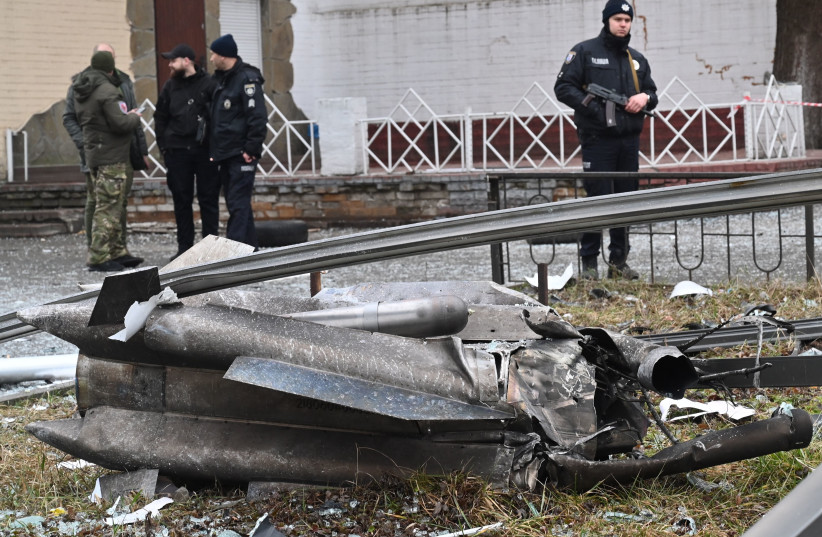Reports on Thursday morning showed Russian attacks across Ukraine, including against key airports and military sites. Air raid sirens were heard in western Ukraine and in Lviv, where some countries, including Israel, have relocated their embassies.
The message that Russia’s unprovoked attack has for the world is clear: other countries can do the same.
In the Middle East, Iran understands that the Russian operation gives it a blank check to continue attacking countries throughout the region. This has potential repercussions for Israel. Jerusalem has always behaved as if it will have to face Iran alone, but the conflict in Ukraine is yet another message for the Middle East.
Ukraine-Russia War
* Russia attacks Ukraine, explosions sound across the country
* Israelis in Ukraine told to evacuate, Israeli diplomats to help
* Guterres to Putin: 'In the name of humanity stop this war against Ukraine'
While Israel-Iran tensions have gone on for decades, the question is whether the Russian war in Ukraine will open a Pandora’s Box of similar invasions and wars.
There is a chance that the war in Ukraine and the US focus on it could lead Iran to believe it can exploit this chaotic time to encourage its proxies to attack Israel. Hezbollah has been threatening Israel and increasingly stockpiling missiles and drones. Tehran could benefit from the Ukraine crisis by either getting a reduction in nuclear sanctions or empowering its proxies.
To understand Iran’s current posture is to understand that in many ways, Iran’s attacks on countries in the region foreshadowed Russia’s aggression. Iran has encouraged its proxies and allies in the region to attack countries such as the United Arab Emirates, as well as US forces in Iraq and Israel.
Iran openly moves drones and ballistic missiles across borders in the Middle East. This week, Israel alleged that the Islamic Republic was providing drone technology to Venezuela. Iran has armed the Houthis in Yemen and sent advisers to encourage their war against Saudi Arabia. It has also empowered Iraqi militias such as Kataib Hezbollah, which has carried out attacks against Saudi Arabia and the UAE alongside its militia partners in Iraq.
In Syria, Iran backs the Assad regime. It has moved proxies and terror groups into areas near the Golan. It has also moved drone threats to Syria to strike at Israel. This resulted in attacks against the Jewish state in February 2018 and in May, when drones entered Israeli airspace, as well as an incident in August 2019 when Israel struck a Hezbollah drone team on the Syrian side of the Golan Heights.
In addition, Iran constructed a base near Albukamal in Syria to facilitate the movement of weapons there and to Lebanon, where Iran has helped Hezbollah stockpile masses of missiles. Tehran also backs Hamas, which has recently rolled out new drone and missile threats.
Overall, the Iranian posture in the region is one that tests the new world order, which shows that countries that are willing to carry out unprovoked attacks will not suffer consequences.
For instance, the US labeled the Houthis in Yemen a terrorist group during the Trump administration. The Biden administration, wanting to reverse Trump’s policies, dropped the terror designation, causing the Houthis to immediately increase their attacks across the region. This shows they felt they could attack whoever they wanted to, most recently carrying out numerous unprovoked attacks on the UAE – with no international response. Iran similarly attacked Saudi Arabia in September 2019 and there was no response.
THE REMARKABLE ability of Iran to carry out attacks across an arc of 3,000 kilometers from Lebanon to the Gulf of Oman shows how the impunity of Russia’s actions in Ukraine is part of a larger trend.
For example, Iran mined six ships in May and June 2019 and there was no response. An Iranian drone attacked a ship in July killing two crew members in the Gulf of Oman and there was no response. Iran has attacked the US garrison at Tanf in Syria; it has carried out drone attacks on US forces in Erbil in northern Iraq. The list goes on and on and on.
Iran will be watching carefully the war that Russia is waging to see how the world reacts. It knows that it has enjoyed impunity for strikes across the region – but it wants to know if it can carry out larger attacks. As the Russian war in Ukraine unfolds, there are also ongoing nuclear talks with Iran.
The Islamic Republic wants those talks to be concluded in its favor. But Iran has indicated it does not care that much about the timeline because it feels that history is on its side.
Tehran believes that its friends in Moscow and Beijing are the future. Toward that end, Iran is pleased to see Russia’s maneuvers because it opens the door for more Iranian attacks. While Iran pays lip service to want to work peacefully with the Gulf – sending its president to Qatar and talking to Oman – it also wants to be able to attack the US, Israel and others with impunity.

The risk that the Russian war in Ukraine could increase the chances of an Israeli clash with Iran is clear. Hezbollah recently launched a drone that flew into Israeli airspace and returned to Lebanon. It then bragged about sending the drone. This was a clear provocation. The terrorist group was testing Israel even while it continues to improve its rockets, missiles and drones. In addition, foreign media reported a missile strike in Syria this week, apparently targeting a Hezbollah site.
This is the context of tensions in the region.
